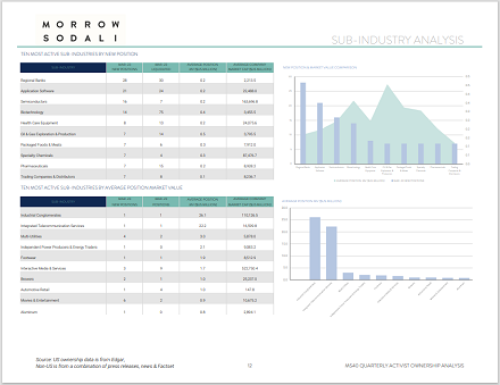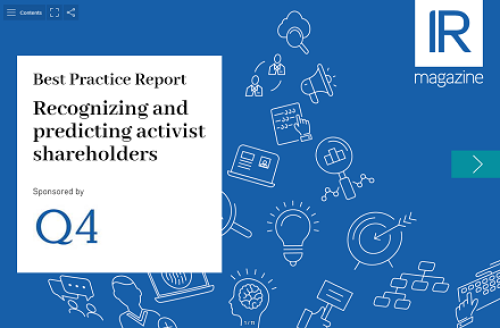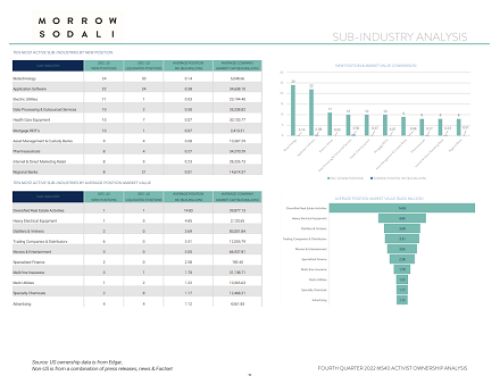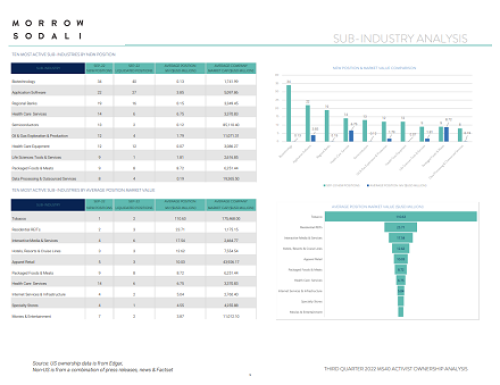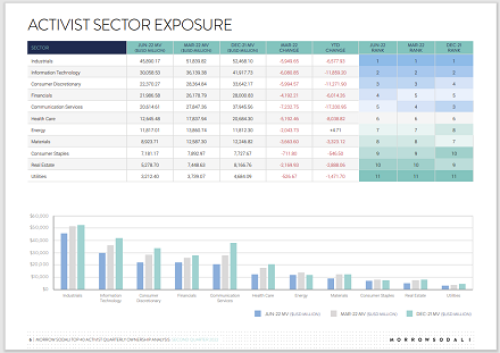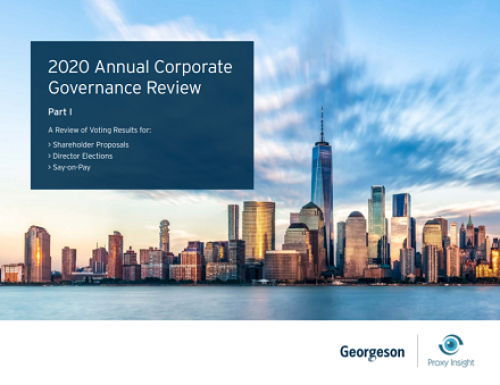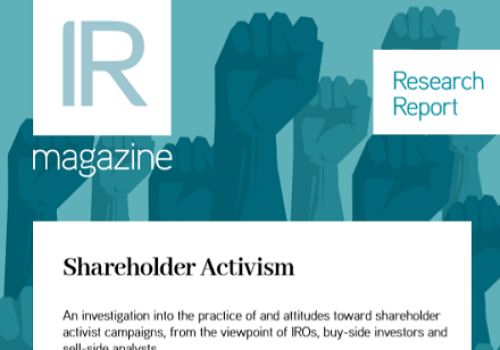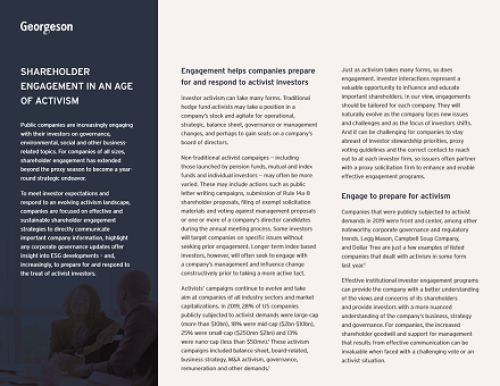Charles Koons, formerly at MacKenzie Partners, recently joined Morrow Sodali as managing director of its activism and contested situations advisory group.
What are the big trends you’re seeing around activism at the moment?
It has been said for several years now that no company is immune to activism, regardless of size or geographic region. This is especially apparent this year with activist situations involving BHP Billiton, General Motors, Nestlé, Arconic, ADP and Procter & Gamble. Companies that were previously considered immune to activism are now frequently targeted. The reach of activists is expected to remain this expansive for the foreseeable future.
The largest index funds, Vanguard, BlackRock and State Street, hold an increasingly significant percentage of the shares outstanding of the large and mega-cap companies by virtue of the massive inflow of capital to these funds over the last several years. The support of even one of these funds is often enough to determine the outcome of a proxy contest.
The increased focus and voice of these index funds on corporate governance is an issue that cannot be ignored. Companies that fail to take heed of the guidelines set forth by these powerful shareholders will find themselves without a strong hand if an activist shows up. Activists will frequently look for governance weaknesses to bolster their argument that change is needed, and that good performance is naturally aligned with good governance.
The tactics employed to reach retail shareholders are quickly evolving. We have seen activists mail individual video players to garner votes in a proxy contest, and companies send instant messages with voting instructions via Facebook. The irony of our interconnected world is that it is more challenging than ever to get people’s attention. Companies as well as activists need to be creative to make their messages stand out from the daily noise of people’s lives.
To what extent are governance issues being considered in activist or contested situations today compared with three years ago? To what degree is governance being used simply as a vehicle to gain support for financially driven change?
More than ever, governance is a critical piece of any activist situation. While most shareholder activism will be focused on improving shareholder value, the activist landscape continues to be altered by the powerful voices of the large index funds regarding governance standards. These funds have taken a thought-leadership role on how a long-term and sustainable perspective should inform the board’s decisions.
Gender diversity in the boardroom will continue to be a prominent area of focus. The August 31 letter sent by Vanguard’s CEO Bill McNabb to directors of public companies sent a very clear message about expectations for board and governance structures, compensation and risk oversight. McNabb states: ‘When the board contributes the right mix of skill, expertise, thought, tenure and personal characteristics, sustainable economic value becomes much easier to achieve.’ Any campaign for shareholder support will have to pay close attention to the governance expectations of its shareholders.
What are the top three things a company should be thinking about in terms of preparedness when it comes to shareholder activism?
To further quote from McNabb’s letter, ‘you can’t wait to build a relationship until you need it.’ I often liken preparedness for shareholder activism to foreign policy. The greater your level of engagement and diplomacy in times of peace, the greater likelihood that you will be able to avoid times of conflict. The three things a company should focus on are:
- Know your owners. It is important to closely monitor your stock ownership and stay informed on the differing perspectives and priorities of your various shareholders. This will outline your shareholder engagement strategy to both investment and governance personnel, which will lead to more informed decision-making by management and the board. Additionally, a close eye on the trading in your stock helps to provide an early-warning system should an activist start to accumulate a position.
- Know your company. You must have an honest and objective sense of how your company is performing in relation to its stated objectives and peers as well as how your board and management are contributing to that performance. This assessment should be done as though you were looking at the company through the eyes of an activist. You should be aware of any weaknesses you may have and employ an ongoing self-evaluation process.
- Know your team. Having a collaborative team of outside advisers that knows your company intimately will help you in your year-round engagement and evaluation process, thus positioning you to minimize the threat of activism and maximize your chances of being successful should such a threat become unavoidable. You want a team that has experience in peacetime as well as conflict so that you do not have to transition to a new set of advisers if conflict arises. Having a previously established relationship of trust and confidence with these advisers will make it much easier to respond effectively to a shareholder activist.
What are some of the most common mistakes you see companies making when it comes to handling an activist or contested situation?
The most common mistakes include taking shareholder support for granted: just because a shareholder was complimentary about your story in the recent past does not mean it will not be supportive of an activist’s effort to bring fresh ideas and perspectives to your board. Listening objectively to your shareholders and thoughtfully evaluating feedback is as important as articulating the corporate vision. By making these efforts, companies are more likely to have engendered credibility and support for their strategies before an activist even emerges. The IRO must provide management with as unfiltered an assessment of shareholder sentiment as possible and enable an ongoing dialogue between management and shareholders.
Another pitfall is having an executive or board member speak ‘off the reservation’ in an activist situation. Activists will look to expose divisions within the company that can be quickly exploited. It is important that debate and discussions stay within the boardroom and that a consistent message is communicated to the investor community.
Finally, companies should avoid taking the low road. Arconic’s Klaus Kleinfeld sent a letter to Paul Singer of Elliott this past spring without his board’s approval, in which he tried to associate Singer with embarrassing past behavior. This quickly boomeranged on Kleinfeld, leading to his prompt departure from the company and paving the way toward a settlement in which three Elliott nominees were placed on the Arconic board.
What advice would you offer to IROs finding themselves in a contested situation for the first time?
Quickly gather all relevant participants – management, board, advisers – and establish clear lines of communication so that your efforts are co-ordinated. One of the biggest advantages an activist has is speed and agility. You do not want to find yourself on your heels each time the activist communicates with your investors either through the media or in proxy filings. The ability to anticipate the activist’s next moves as much as possible and to respond quickly and effectively to it will be key to winning shareholder support.


